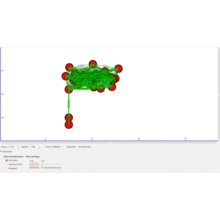Category Archive: 'MS in NS3'
Driven by the advent of sophisticated and ubiquitous applications, and the ever-growing need for information, wireless networks are without a doubt steadily evolving into profoundly more complex and dynamic systems. The user demands are progressively rampant, while application requirements continue to expand in both range and diversity. Future wireless networks, therefore, must be equipped with the ability to […]
Cloud computing and virtualization are two key technology priorities for telecom service providers. Besides total cost reduction, there are many strategic objectives while adopting cloud technology into the telecom sector. Telecom service providers core assets and strength lies in their communicationnetworks, but these alone are not enough to maintain the industry in the higher level […]
In a centralized radio access network (C-RAN) scenario the joint coordination of radio (e.g., remote radio units, baseband units) and transport (e.g., optical cross connects) resources can be achieved viasoftware defined networking (SDN) control plane, where a global orchestrator harmonizes the use of resources across all network segments. The more accurate the information about each domain (i.e., the abstraction of wireless and […]
Ethernet has become the primary network protocol used due to its undeniable advantages such as low cost, high speeds or ease of management. Being a best effort protocol, the IEEE Data Center Bridging Task Group developed a series of Layer 2 enhancements including Quantized Congestion Notification (QCN) and enabled a loss less environment. In this paper we […]
As it has become the norm for cloud providers to host multiple datacenters around the globe, significant demands exist for inter-datacenter data transfers in large volumes, e.g., migration of big data. A challenge arises on how to schedule the bulk data transfers at different urgency levels, in order to fully utilize the available inter-datacenter bandwidth. […]
Programmability in wireless access networks can provide unprecedented flexibility in meeting the communications needs of a diverse set of wireless devices under changing demand and networkconditions. Programmability also holds the promise of enabling multiple simultaneous virtual operators providing a variety of access networks that offer different services using different business models. In this paper we present our work on enabling […]
Software-Defined Networking not only addresses the shortcoming of traditional network technologies in dealing with frequent and immediate changes in cloud data centers but also made network resource management open and innovation-friendly. To further accelerate the innovation pace, accessible and easy-to-learn testbeds are required which estimate and measure the performance of network and host capacity provisioning approaches simultaneously within a data center. This is […]
Finding an effective and simple unified control plane (UCP) for IP/dense wavelength division multiplexing multilayer optical networks is very important for network providers. Generalized multi-protocol label switching (GMPLS) has been in development for decades to control optical transportnetworks. However, it is extremely difficult to deploy in real operational products, as there is still much non-GMPLS-capable equipment. On the other […]
Software Defined Networking (SDN) and Named Data Networking (NDN) are two topics which have received lots of attention in the networking research community in recent years. While both have emerged independently from each other we believe that their core features can be well aligned to each other. Hence combining both may hold potential benefits for network operators. In this paper we investigate the advantage […]
Cloud data center have to accommodate many users with isolated and independent networks in the distributed environment to support multi-tenant network and integrity. User applications are stored separately in virtual network. To support huge network traffic data center networks require software to change physically connected devices into virtual networks. Software defined networking is a new paradigm allows networks easily programmable that helps in controlling and managing virtual networkdevices. Flow decisions are made based upon […]

 Click Here to watch our latest output video using NS3 simulator
Click Here to watch our latest output video using NS3 simulator  Click Here to watch our latest projects screenshots using NS3 simulator
Click Here to watch our latest projects screenshots using NS3 simulator